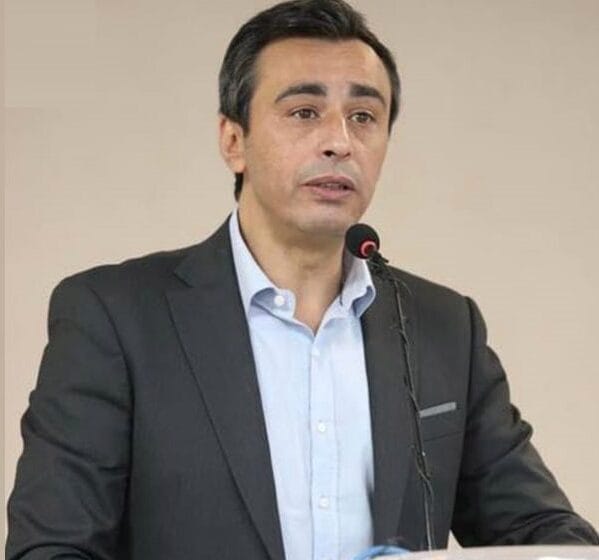
Detained
About
Position/Affiliation: Civil society activist, founder of the Dostourna Network, and a leader in the opposition National Salvation Front. After the 2021 coup he cofounded the opposition political initiative “Citizens Against the Coup.” Ben Mbarek was a supporter of President Saied during his election campaign in 2019, but since Saied announced the freezing of Parliament, its subsequent dissolution, and assuming absolute power in the country on July 25, 2021, he has become one of Saied’s most prominent opponents.
Year of birth: 1968
Occupation: Constitutional Law University professor
Nationality: Tunisian
Lawyers: Dalila Msaddek-Mbarek, Ines Harrath
Date Targeted
Current Status
Charges
Conspiracy against the internal and external security of the state
Cases and Violations
Cases: One case against him
Judicial body: Anti-terrorism judicial pole
Procedures and breaches:
- February 23, 2023: Ben Mbarek was arrested late at night by the anti-terrorism squad after his father, human rights activist and opposition political activist Ezzeddine Hazgui, was arrested (the father was released hours later).
- March 10, 2023: Ben Mbarek went on a full hunger strike with a number of detainees in the conspiracy case against what they called a “policy of abuse” to which they were subjected inside prison.
- March 23, 2023: The Indictment Chamber ruled to postpone consideration of the request to release Ben Mbarek on bail, along with opposition politicians and activists Chaima Issa, Issam Chebbi, Khayyam Al-Turki, Ghazi Chaouachi, Ridha Belhaj, Lazhar Lakremi, and Abdelhamid Jelassi, after the defence submitted a release request to the competent indictment chamber.
Very poor living conditions: Lawyer Ines Harrath stated, in her Facebook post, after visiting Jawhar Ben Mbarek, Ridha Belhaj, Issam Chebbi, Ghazi Chaouachi, and Lazhar Akremi, and after meeting colleagues who visited Al-Turki, that they were “deprived of the right to wash and exercise, and they were transferred to extremely dirty rooms full of insects and not equipped with any sanitary facilities, as human needs must be relieved in a hole on the floor, in addition to depriving the prisoner of the most basic rights such as treatment,” she asserted. Ines Harath also considered that “there are orders from the regime to the prison administration to endanger the lives of political detainees by placing them with carefully selected common crime prisoners, most of whom were imprisoned for premeditated murder cases,” according to what was stated in her facebook post.
- July 13, 2023: The indictment chamber of the Tunisian Court of Appeal decided to reject the defense’s request regarding the release of Jaouhar Ben Mbarek, Issam Chebbi, Mohamed Khayam Al-Turki, Abdelhamid Jelassi, Ridha Belhaj and Ghazi Chaouachi.
- August 22, 2023: The investigating judge in the anti-terrorism judicial pole in Tunisia decided to extend the imprisonment of 6 opponent detainees for another 4 months, pending investigation into the case of conspiracy against state security, including Jaouhar Ben Mbarek. The defense team for the defendants said that it appealed the investigating judge’s decision to the indictment chamber, which will consider it and either approve or overturn it.
- September 21, 2023: The indictment chamber of the Court of Appeal in Tunis refused to release the defendants in the “conspiracy against state security” case, in response to the appeal submitted against the investigating judge’s decision to extend the period of pre-trial detention for a number of politicians, including Jaouhar Ben Mbarek.
- September 27, 2023: The Defense Committee for Political Detainees in Tunisia announced that Ben Mbarek was starting a hunger strike to demand his release. The Defense Committee said in a statement published on its official Facebook page, “Jaouhar Ben Mbarek informed the Defense Committee that he has gone on a hunger strike starting at midnight on the night between Monday, 25 and Tuesday, September 26, in protest against his imprisonment.” It added that Ben Mbarek announced “that he will not end this strike until the grievance is lifted and he and all the detainees in this manufactured and fabricated political case are released”.
- October 12, 2023: The “Detained Political Leaders’ Defense Committee in Tunisia” in what is known as the “Conspiracy Against State Security Case” confirmed that political prisoner Jaouhar Ben Mbarek and his fellow hunger strikers agreed to suspend their strike after several appeals were sent to them by human rights and political organizations. A number of parties and activists sent an appeal to Ben Mbarek and his companions to end the hunger strike, and they said in a statement: “We are civil society activists and national figures who have signed this call and are committed to defending rights and freedoms and committed to struggling for them in our country.” The statement affirmed “support for the political detainees in what is known as the case of conspiracy against state security in particular, and the rest of the cases that target politicians, journalists, judges, and civil society activists in general, and we denounce the violations they have been subjected to as a result of these injustices and the arbitrary measures imposed on them in accordance with executive orders. In view of his deteriorating health condition, his transfer to hospital, his refusal to undergo the necessary examinations, and in view of the risks to his life, and for the safety of his body, we call on him to end the hunger strike, with full appreciation for the nobility of his struggle and our high tribute to the extent of his sacrifices along with the other political detainees who were unjustly arrested with him in the same case, namely Ridha Belhaj, Ghazi Chaouachi, Khayam Al-Turki, Abdelhamid Jelassi, and Issam Chebbi”.
